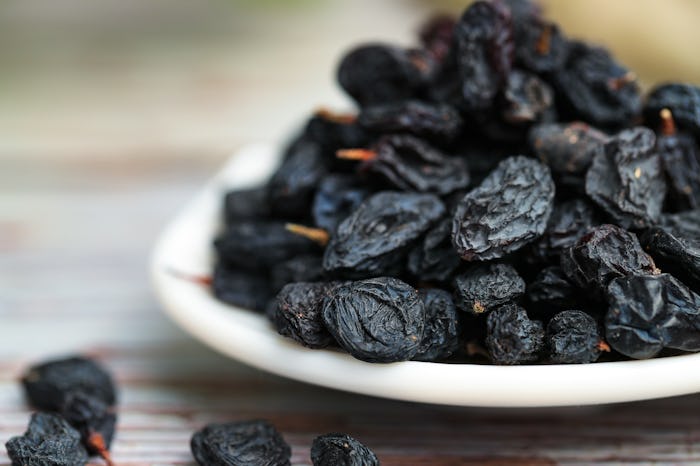Life

Raisins Aren't High On The Choking List, But Here's When Toddlers Can Eat Them
Although my own mother has a serious aversion to them, I have been a fan of raisins for as long as I can remember. It was a no-brainer when my kids started consuming copious amounts of snacks to introduce them to the delicious dried grapes that provide a pop of flavor to oatmeal, taste amazing mixed into a batch of cookies, and can be eaten by the handful without resulting in a tummy ache. Before I decided to go all out and hand over a box to my kiddos, I wondered, can toddlers eat raisins?
Raisins are tiny and somewhat sticky, which makes me question giving them to extremely small children, and experts agree that there is a specific age and developmental stage where they can be safely provided to toddlers. "Raisins can be added to the finger food list for feeders. Most infants are eating finger foods at 8 to 9 months," says Dr. Natasha Burgert, a pediatrician practicing in Kansas City, but you'll want to wait until your child is confident enough to chew and swallow before giving them this sweet snack.
While they can be high in sugar and calories since they are a dried fruit, raisins are a wonderful source of fiber. One serving of raisins accounts for approximately 10 to 24 percent of a person's daily fiber needs depending on age and gender, according to a report by Healthline. They also report that raisins are chock full of antioxidants and provide a decent amount of calcium at 45 milligrams per one half cup serving.
So if they're a healthy snack, why the age restriction? According to the American Academy of Pediatrics, food accounts for more than half of choking incidents in children. While it might seem like offering tiny pieces of food is harmless, gummy dried fruits can present a danger to babies if they get lodged in their throats.
"Raisins can be sticky and difficult to swallow, but at an appropriate size, they should not be a significant risk. Raisins are not on the 'high risk of choking' list," Dr. Burgert says. So, they're a-ok for toddlers, but until a child is eating finger foods with successful chewing and swallowing, it is best to hold off on raisins.
Raisins mixed into oatmeal or cereal and served to children before they are developmentally ready can pose the some risks since they are not often able to separate the raisin from the rest of the food in order to chew it properly. If you are concerned, chopping the raisins into small pieces and incorporating them well into batter before baking any baked goods is one way to help ensure your toddler can safely consume foods containing raisins.
"Kids need a very diverse and dynamic diet from first bites, guided by the eating habits and traditions of their family. Older babies and toddlers should be eating a modified version of whatever the family eats. No special meal plans required, but adapting the size or consistency of the foods for safe feeding," says Dr. Burgert. "As a general 'rule of thumb,' all finger foods should be soft enough to swallow whole and roughly cut to a size that is smaller than a Cheerio to avoid choking risks. And make sure your child is seated when eating. Many choking events happen when kids are running around with food in their mouths."
If you aren't confident in your child's ability to safely chew and swallow raisins, your best bet is to hold off offering this particular food until they are a bit older and better able to consume raisins safely. Raisins are absolutely delicious and a wonderful healthy snack option, but making sure your toddler has the ability to safely eat them is top priority.